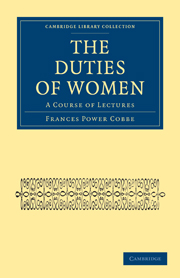LECTURE I - INTRODUCTORY
Published online by Cambridge University Press: 05 July 2011
Summary
The spectacle of the waste of precious things is always one of the saddest in this mysterious world. We are often called on to regret huge ships sunk in the sea, famous old books burnt or lost, beautiful temples shattered by shot and shell, harvests destroyed by storm or drought, and men with splendid gifts going down to an untimely grave, all their training for a life of usefulness ending in silence and oblivion.
But what are all these forms of waste compared to that which has been going on, in all lands and ages, of the lives of women—waste as regards the purposes either of their own moral growth or natural happiness, and waste of their faculties to make the world happier and better? Think of women's natures as meanly as we may, rank the powers wherewith they are endowed at the lowest possible estimation, still it is deplorable to reflect on the spendthrift recklessness wherewith they have been thrown away for no advantage to any living being, but merely for some senseless prejudice. Iphigenia, sacrificed to make the wind blow, was in truth a typical victim of superstitious custom and masculine selfishness. A lark born to sing its joyous little song at leisure far aloft in the blue sky, caught and shut up in a cage in a sordid city lane, scarcely suffers a more grievous wrong than the souls of myriads of our sisters cooped in gynecæums and zenanas, and harems and convents, and in many a tome little better than a nunnery or a seraglio.
- Type
- Chapter
- Information
- The Duties of WomenA Course of Lectures, pp. 1 - 36Publisher: Cambridge University PressPrint publication year: 2010First published in: 1881

